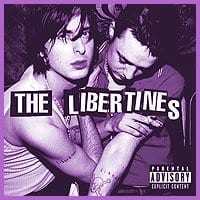Oh, the unbearable lightness of being Björk. On Medulla, her first solo album in three years, our fair pixie is examining the fragility of human mortality and she’s also in love, questioning the love and celebrating it. The press is going on about this album being avant-garde, all vocal layering, experi-mental with no instrumentation. But it really isn’t that far off from her past efforts (it’s just more classical, not so pop). With the ample help of Rahzel (The Roots), Mike Patton (Faith No More), Robert Wyatt (Soft Machine), The Icelandic Choir, Tagaq (Inuit throat singer) and various human beatboxes… who needs guitars?
The mostly human-made computer-manipulated sounds on the album have a creepy cold grandness to them. The album very much reminds me of Remembrance Day services at school. It’s all very pretty but something scary is going on and it gets a tad boring at times. But the words impress. Björk has never written more thought-provoking, genuine lyrics. On “Where Is The Line” everything is compact and cunning with soldiering beats and the choir backing Björk’s thoughts. “Where is the line with you/ I want to be flexible.” “Vokuro” is a magnificent, majestic Icelandic choral piece.
“Oll Birtan,” “Ancestors” and “Submarine” are annoying and extremely unlistenable.
I’m in love with “Oceania” and its nifty playful organic choir and spooky metallic samples. It’s all wiggles and giggles to gargling beats as Björk exclaims, “Every boy is a snake/ Is a lily/ Every pearl is a lynx/ Is a girl.” It’s a garden of unearthly delights.
“Triumph Of The Heart,” the last track, is the only song on the album you can certainly dance to. Warped and whimsical with a human trombone and Björk’s strange and beguiling verse. “Smooth soft red velvety lungs/ Are pushing a network of oxygen joyfully/ Through a nose/ Through a mouth/ But all enjoys/ Which brings us to/ The triumph of a heart/ That gives all/ That gives all.” Sexiness isn’t all tits and ass. It’s blood and bone. Who knew?
The Libertines’ self-destructing lead singer Pete Doherty is a self-confessed drug addict and convicted thief. His tense love/hate relationship with band mate and co-songwriter Carl Barat has made their self-titled second album a bit of a mess. But what a pretty mess! It’s straight ahead vigilant cocky pop. They could be as strong and vital as The Smiths, The Kinks or The Clash. But if Doherty keeps spinning out of control they’ll just become The Rehab Four.
The Clash’s Mick Jones is once again at the helm as producer (he produced 2002’s fiery debut, Up The Bracket). He gives the solid songs an aggressive gin-soaked beauty and the jangly lazy underdone tunes a confessional truth. Lyrically and musically the album deals with Doherty’s emotional tortured soul without falling apart. Doherty never becomes a joke. Barat and Jones are way too talented and smart to let that happen.
“Music When The Lights Go Out” showcases Doherty’s posh mod stylings (similar to Pulp’s Jarvis Cocker) as guitars gently weep and jangle to his sombre commentary. “All the memories of the pubs/ And the clubs and the drugs and the tubs/ We shared together/ Will stay with me forever.” The aggressive “Arbeit Macht Frei,” “What Katie Said” and “What Became Of The Likely Lads” are solid loveliness. On “Can’t Stand Me Now” the hard-hitting drums and guitars reveal Doherty’s funny sad words. “Cornered, the boy kicked at the world/ The world kicked back a lot fuckin’ harder.”
MEDULLA.
Björk.
Elektra. $15.99.
THE LIBERTINES.
The Libertines.
Rough Trade. $14.99.

 Why you can trust Xtra
Why you can trust Xtra


